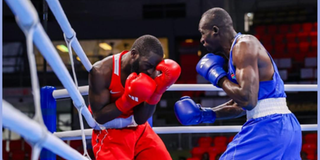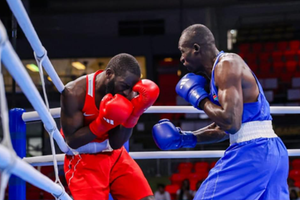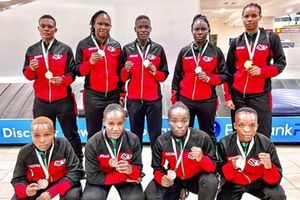
Edwin Okong'o of Kenya (right) stops Mohamadou Gory of Mali in the first round of their light heavyweight round of 64 at the Olympic qualifiers in Bangkok this week. Okongo later lost on points to Dalai Ganzorig of Mongolia in the round of 32.
Not a single Kenyan boxer has qualified for the 2024 Olympic Games, pointing to the gradual but steady decline of the sport in the country over the last 60 years.
Kenyan boxers have failed to qualify for the July 26 - August 11 Olympics in three attempts, first at the September 9-23 African qualifiers in Dakar last year, followed by the first World Qualification Tournament in Busto Arsizio, Italy, from March 3-11, followed by the second World Boxing Qualification Tournament in Bangkok from May 24 - June 2.
Heavyweight Peter Abuti’s loss to Poland’s Mateusz Bereznicki in the second World Boxing Qualification Tournament in Bangkok, on Friday, sums up an underwhelming performance by Kenya’s boxing team ‘Hit Squad’ in the Olympic Games qualifiers.

Kenya’s Nick Okoth (right) with trainer David Munuhe preparing for the Tokyo 2020 Olympic Games boxing competition.
Abuti’s 5-0 points loss to Polish boxer Mateusz Bereznicki in the third and final Olympics qualifier event at the Indoor Huarmark Stadium in Bangkok means all Kenyan boxers have lost their fights in the south East Asian nation and subsequently failed to qualify for the Olympic Games.
Abuti’s defeat follows the elimination of his teammates, bantamweight Amina Martha, welterweight Friza Anyango, middleweight Elizabeth Andiego, light-heavyweight Edwin Okong’o, and light-middle weight Boniface Mogunde, who is Kenya’s deputy captain. Four officials - Boxing Federation of Kenya President Anthony “Jamal” Otieno Ombok, head coach Musa Benjamin who is also BFK’s treasurer, deputy coach David Munuhe who is also BFK’s secretary, and trainer John Waweru who is also the fixtures secretary - travelled with the team to Bangkok.
The ‘Hit Squad,’ which was once a force to reckon with in major competitions like the Africa Boxing Championships, African Games (formerly All-Africa Games), King’s Cup, Commonwealth Games, and World Boxing Championships, has now been reduced to a punching bag, literally.
In 2022, Kenya failed to secure a medal at the Commonwealth Games for the first time since the 2002 Games held in Manchester, England. In contrast, Kenyan boxers had their opponents on their knees at the 1987 African Games, and at the 1988 Seoul Olympics.
In 988 when Robert Wangila of Kenya became the first African boxer to win gold medal at the Olympic Games, Kenya had hosted a hugely successful edition of Africa Games a year earlier at the purpose-built Moi International Sports Centre, Kasarani, Mikhail Gorbachev was still the president of the Soviet Union, and Berlin Wall still stood tall between East and West Germany.
Geopolitical tensions
The end of Cold War, the geopolitical tensions between United States of America and Russia and their respective allies, was two years away, and Nelson Mandela had yet to be released from Victor Verster Prison by the apartheid regime in South Africa. Kenya, a one-party state by law, witnessed massive rigging the same year during the General Election held through mlolongo (queuing) system.
Two years earlier, Diego Maradona had led Argentina to victory over West Germany in the 1986 Fifa World Cup held in Mexico, and Mike Tyson had won World Boxing Council heavyweight title for the first time.

Kenya’s Elly Ajowi takes to the ring for his heavyweight clash against Cuba’s Julio Cesar La Cruz at the Tokyo 2020 Olympic Games boxing competition. La Cruz won on points.
Wangila died in 1994 at only 27, but his awe-inspiring performance at the 1988 Olympic Games held in Seoul, South Korea, stands out because for the first time, Kenya won gold medal at the quadrennial games in a sport other that athletics. It was a departure from the country’s tradition of overreliance on athletics for gold medals at the Olympics. Wangila’s gold medal and Chris Sande’s bronze in middleweight accounted for two out of Kenya’s total of nine medals in Seoul.
Waruinge won bronze
But Wangila not the first Kenyan boxer to win a medal at the Olympics.
That honour goes to the late Philip Waruinge who, at the age of 19, represented Kenya at the Olympics for the first time, in Tokyo. Waruinge won bronze at the 1968 Olympics in Mexico City, and silver at the 1972 Games in Munich, all in featherweight category. Although he lost to the eventual winner Antonio Roldan of Mexico at the 1968 Games, he returned home with the Val Baker Trophy often awarded to the most outstanding boxer at the Games “for demonstration of excellence in the ring.”
Waruinge, who died in October 2022 at the age of 77, was the only Kenyan boxer to have participated in three editions of the Olympic Games. His team mates at the 1972 Olympics, Richard “Dick Tiger’’ Murunga and Sam Mbugua won silver and bronze in welterweight and lightweight categories respectively, and boxing accounted for three medals out of the nine Kenya won at the Games.
It was a golden age for Kenyan boxing during which local pugilist also dominated inter-cities boxing championships contested by boxers from Nairobi, Kampala, and Dar es Salaam.
Murunga, who founded the Kenya Professional Boxing Association, died at the age of 65 in 2018 while undergoing treatment at Kenyatta National Hospital.
Kenya’s boycott of the 1976 and 1980 Olympics disrupted the good performance by her boxers at the Olympics. Kenya boycotted the 1976 Olympics in Montreal, Canada, alongside 28 other countries to protest the tour of apartheid-era South Africa by New Zealand’s rugby team All Blacks. Kenya also boycotted the 1980 Olympic Games in Moscow to protest against the Soviet Union’s invasion of Afghanistan.
But Kenyan boxers still showed flashes of brilliance at the next edition of the Olympics held in Los Angeles in 1984 when Ibrahim Bilali won won bronze medal in flyweight category to add to the gold medal that Julius Korir had won in men’s 3,000 metres steeplechase, and Mike Musyoki’s bronze from men’s 10,000m final.
But 36 years since Wangila’s historic performance in Seoul, Kenya’s boxing is on its deathbed.
Performances by boxers Edwin Okong’o and Amina Martha at the March 8 - 23 African Games in Accra might have brought a sense of relief, but the results were inconsequential as far as qualification for the Olympic Games is concerned. It is telling that Kenya National Sports Council, the body mandated with selecting Team Kenya athletes for African Games, only carried four boxers against 52 runners. In Accra, Okong’o gave Kenya her first win in 17 years at the African Games when he beat Moroccan Yassine Elouarz in the middleweight category. Martha got injured in the first round of women’s bantamweight final against Kareem Shukura of Nigeria but still claimed silver medal.
Good performance
Good performance by Kenyan boxers at the African Games came in 1978 (Algiers), 1987 (Nairobi), and in 1995 (Cairo). Kenya led in the medal standings at the games in 1987.
By far, Kenyan boxers registered the best performance in boxing at the 1987 edition of the games held in Nairobi. Kenya collected eight gold medals out of a possible 12. The gold medallists were Maurice Maina (flyweight), Stephen Mwema (featherweight), John Wanjau (Light), Patrick “Mont” Waweru (light welterweight), David “DK” Kamau (welterweight), Robert Wangila (light middleweight), Mohammed “Bodi” Orungi (middleweight), and Chris Odera (super heavyweight).
All the winners qualified for the 1988 Seoul Olympics, where Wangila became the first African to win gold medal at the Olympics via third round technical knock-out against Frenchman Laurent Boudouni. Sande brought home bronze medal in middleweight category. But 36 years later, Kenya will not send a single boxer to the Olympics.
But where did the rain start beating Kenyan boxers?
At the 1985 African Games held in Harare, Kenya won eight medals; two gold, one silver and four bronze. The gold medals came through Peter Odhiambo and Omar “Kassongo” Ahmed.
The ‘Hit Squad’s fortunes plunged significantly in 1991 African Games in Cairo, where Joseph Akhasamba was the only Kenyan boxer to reach the final, eventually settling for silver.
Boxing fans were made to wait for 12 years for a gold medal in boxing, relief coming at the 2003 games in Abuja, where Suleiman Bilali won gold. Bilali again won gold in the 2007 games in Algiers, then the medals drought resumed for two decades until Okong’o won gold in Accra in March.
Due to relatively easy opponents, Africa Olympic Games qualifiers held in Dakar in September last year offered the best chance for Kenyan boxers to qualify for the Olympics, but it .

Christine Ongare (red) of Kenya competes against Priyanka Dhillon (blue) of Canada during the over 45kg-48kg Minimum-weight Quarter-Final match at the 2022 Commonwealth Games in Birmingham.
Kenya is paying the price for poor management of the game locally, lack of clear separation of management and coaching duties at the federation, and lack of meaningful competitions.
BFK chairman, Anthony “Jamal” Ombok who swept to office in 2019 on a platform for change, leads a federation in which elected officials also serve as national team coaches.
BFK’s executive is split on whether or not treasurer Benjamin Musa, secretary general David Munuhe and competition’s secretary John Waweru should continue handling the team as coaches.
Boxing has changed
“The style of coaching has to change. Boxing has changed, and boxers should be allowed to express themselves in the ring. The idea of only relying on knockouts to win bouts as we are doing is outdated. Boxing has changed,” a former international boxer who has now turned professional told Nation Sport. He preferred anonymity for fear of reprisals.
The boxer reckons Kenyan coaches are mismanaging the weight categories by forcing boxers to cut weight drastically so as to compete in weight categories they aren’t familiar with. He reckons national team coaches need refresher courses to stay relevant.
The national team is also seen to be overly dependent on Kenya Police Service and Kenya Defence Forces teams for boxers. The two clubs normally supply more than half of the national team members at any given time.
Musa is adamant that changing the technical bench is not the only solution to the problems facing Kenyan boxing. He is of the opinion that Kenya needs proper investment in training programmes and facilities for boxers.
“I go back to the old adage saying that opportunities only fall to those well prepared. Top boxing nations compete in 20 or so international tournaments in a year and it’s difficult to compete with countries which have invested heavily in preparations and residential training camps that run throughout the year,” explained Musa. BFK Communications Director Duncan Kuria said failure to qualify for the Olympics doesn’t necessarily reflect a drop in the standard of boxing in the country.
Kuria noted that the quota system International Olympic Committee introduced in continental qualifers that limits each weight category to just one qualifier has not only affected Kenya but also other African countries.
“It means that only seven tickets were up for grabs in the male category, and 11 were in the women’s category in the African qualifiers for the Olympics, which is unfair,” Kuria, explains, adding that 38 fewer boxers will compete in the Paris Olympics compared to the number that competed in the 2020 Tokyo Olympics.
There were 186 male boxers in Tokyo but only 124 male boxers will be in Paris. Some 33 African boxers (22 men and 11 women) made it to Tokyo, but only 18 (11 women and seven men) will be in Paris. Kuria also pointed out that Cuba, a giant in boxing, has only qualified four boxers for Paris. He defended BFK’s choice of coaches.
“Duplication of roles is only forbidden among referees and judges,” he said. “ In any case, they are the best coaches we have in the country.”








